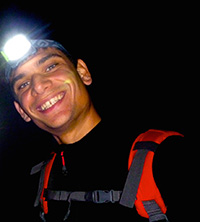Torno subito
Alessandra Amati
 Master's Degree in Biology and Human Evolution at the University of Rome "Tor Vergata", A.A. 2015/2016, defending a thesis in Human Ecology entitled: "Anthropometric analysis on a sample of Italian primary school pupils: ergonomic evaluation of school sessions". From 2017 he collaborates to the teaching and research activities of the EcoMicro lab. Winner of an annual contract 'Torno subito' granted by the Regione Lazio for the year 2017 to develop the project: "Bioremediation: microbiological rehabilitation of domestic wastewaters for the indoor cultivation of edible plants". The first phase of the project (3 months) is carried out at the Design Dept. of the Milan Polytechnic, supervisor Fiammetta Costa. The second phase will be carried out at the Dept. of Biology, Tor Vergata University, supervisor L. Migliore. The project is dedicated to the biological treatment of dishwasher wastewater using bioremediation technologies, exploiting the degradative metabolic potential of environmental bacterial species to degrade the nutrients contained in the wastewater. The identification and selection of the bacterial strains - naturally present in household waste - with a high biodegradation activity, the objective of the research will be the ‘upcycling’ of nutrients present in domestic wastewater, in the indoor cultivation of edible plants and/or the wastewater cleaning for water reuse.
Master's Degree in Biology and Human Evolution at the University of Rome "Tor Vergata", A.A. 2015/2016, defending a thesis in Human Ecology entitled: "Anthropometric analysis on a sample of Italian primary school pupils: ergonomic evaluation of school sessions". From 2017 he collaborates to the teaching and research activities of the EcoMicro lab. Winner of an annual contract 'Torno subito' granted by the Regione Lazio for the year 2017 to develop the project: "Bioremediation: microbiological rehabilitation of domestic wastewaters for the indoor cultivation of edible plants". The first phase of the project (3 months) is carried out at the Design Dept. of the Milan Polytechnic, supervisor Fiammetta Costa. The second phase will be carried out at the Dept. of Biology, Tor Vergata University, supervisor L. Migliore. The project is dedicated to the biological treatment of dishwasher wastewater using bioremediation technologies, exploiting the degradative metabolic potential of environmental bacterial species to degrade the nutrients contained in the wastewater. The identification and selection of the bacterial strains - naturally present in household waste - with a high biodegradation activity, the objective of the research will be the ‘upcycling’ of nutrients present in domestic wastewater, in the indoor cultivation of edible plants and/or the wastewater cleaning for water reuse.
Chiara Conte
 Student of the Master of Science degree in Marine Biology at Università Politecnica of Marche, Ancona, A.Y. 2016/2017, working on a Thesis project on the bleaching caused by sunscreen on Acropora acropora. 'Torno subito (Be right back)' research grant holder (1 year), awarded through public selection by Regione Lazio in 2016 to develop the project: “Method for studying the effect of the ocean acidification on marine organisms". The first phase of the project (4 months) will be carried out in the Mote Tropical Research Laboratory of Summerland Key (FL, USA). The second phase will be carried out at the Department of Biology of the Tor Vergata University, supervisor L. Migliore. The project is dedicated to the evaluation of the ecological assessment of Thalassia testudinum meadows within the Mote's nursery of Acropora cervicornis, to evaluate the possible interaction seagrass-corals. The assessment will be performed according to Rotini et al. (2013) and Mejia et al. (2016): an integrated approach based on morphometric and biochemical plant's analyses coupled to the study of the associated microbial communities by Next Generation Sequencing technique.
Student of the Master of Science degree in Marine Biology at Università Politecnica of Marche, Ancona, A.Y. 2016/2017, working on a Thesis project on the bleaching caused by sunscreen on Acropora acropora. 'Torno subito (Be right back)' research grant holder (1 year), awarded through public selection by Regione Lazio in 2016 to develop the project: “Method for studying the effect of the ocean acidification on marine organisms". The first phase of the project (4 months) will be carried out in the Mote Tropical Research Laboratory of Summerland Key (FL, USA). The second phase will be carried out at the Department of Biology of the Tor Vergata University, supervisor L. Migliore. The project is dedicated to the evaluation of the ecological assessment of Thalassia testudinum meadows within the Mote's nursery of Acropora cervicornis, to evaluate the possible interaction seagrass-corals. The assessment will be performed according to Rotini et al. (2013) and Mejia et al. (2016): an integrated approach based on morphometric and biochemical plant's analyses coupled to the study of the associated microbial communities by Next Generation Sequencing technique.
Klaudia Krasojevic
 Master's degree in Evolutionary Biology, Ecology and Applied Anthropology at the University of Rome "Tor Vergata", A.A. 2016/2017, defending a thesis in Ecotoxicology entitled: "Ecotoxicological evaluation of Carbon based nanomaterial on Lemna gibba". Winner of an annual contract 'Torno subito' granted by the Regione Lazio for the year 2017 to develop the project: "Setting up an eco-friendly dishwasher: automated control of greenhouses for the growth of plants irrigated with domestic wastewater". The first phase of the project (3 months) will be carried out at the Design Dept. of the Milan Polytechnic, supervisor Fiammetta Costa. The second phase will be carried out at the Dept. of Biology, Tor Vergata University, supervisor L. Migliore. The project is dedicated to the set up of an automated system to monitor the chemical and physical characteristics of the dishwasher wastewaters to get the best management of indoor greenhouse for the growth of edible plants. The plants can absorb nutrients and convert into plant biomass. The automated control will be performed by an Open Source control system (Arduino).
Master's degree in Evolutionary Biology, Ecology and Applied Anthropology at the University of Rome "Tor Vergata", A.A. 2016/2017, defending a thesis in Ecotoxicology entitled: "Ecotoxicological evaluation of Carbon based nanomaterial on Lemna gibba". Winner of an annual contract 'Torno subito' granted by the Regione Lazio for the year 2017 to develop the project: "Setting up an eco-friendly dishwasher: automated control of greenhouses for the growth of plants irrigated with domestic wastewater". The first phase of the project (3 months) will be carried out at the Design Dept. of the Milan Polytechnic, supervisor Fiammetta Costa. The second phase will be carried out at the Dept. of Biology, Tor Vergata University, supervisor L. Migliore. The project is dedicated to the set up of an automated system to monitor the chemical and physical characteristics of the dishwasher wastewaters to get the best management of indoor greenhouse for the growth of edible plants. The plants can absorb nutrients and convert into plant biomass. The automated control will be performed by an Open Source control system (Arduino).
Francesca Maietta
 Master of Science degree in Evolutionary Biology and Ecology at the University of Rome “Tor Vergata”, A.Y. 2013/2014, defending a Thesis entitled: " Growth and lipid production in culture by an isolate of Cylindrotheca closterium (Ehrenberg) Reimann & J.C. Lewin (Bacillariophyta)".
Master of Science degree in Evolutionary Biology and Ecology at the University of Rome “Tor Vergata”, A.Y. 2013/2014, defending a Thesis entitled: " Growth and lipid production in culture by an isolate of Cylindrotheca closterium (Ehrenberg) Reimann & J.C. Lewin (Bacillariophyta)".
'Torno subito (Be right back)' research grant holder (1 year), awarded through public selection by Regione Lazio in 2016 to develop the project: "Caretta caretta as bioindicator in marine ecosystems".
The first phase of the project (3 months) will be carried out in the nonprofit association “Filicudi WildLife Conservation”, supervisor Dr. Monica Blasi. The second phase will be carried out in the Department of Biology of the Tor Vergata University, supervisor L. Migliore.
The project is dedicated to the identification of microbiota and epibionts colonizing the carapace of Caretta caretta sampled in the sea stretch of the Aeolian Islands. This information will fill the gap of these data in literature and the shells of the loggerhead sea turtles “Caretta caretta”, of which there isn’t much. In fact, to promote the conservation of this species and realize national management plans for the protection of these sea turtles, which according to the IUCN Red List they are classified “endengered”, as many possible aspects of their physiology and ecology should be known.
Filippo Spanu
 Master of Science degree in Evolutionary Biology, Ecology and Applied Anthropology at the University of Tor Vergata (Rome), A.Y. 2015/2016, defending a Thesis entitled: “A new ecotoxicological bioassay on Vibrio anguillarum for classical and emerging pollutants".
Master of Science degree in Evolutionary Biology, Ecology and Applied Anthropology at the University of Tor Vergata (Rome), A.Y. 2015/2016, defending a Thesis entitled: “A new ecotoxicological bioassay on Vibrio anguillarum for classical and emerging pollutants".
'Torno subito (Be right back)' research grant holder (1 year), awarded through public selection by Regione Lazio in 2016 to develop the project: “The Jetson’s Kitchen: domestic wastewater upcycling and indoor vegetables production".
The first phase of the project (6 months) will be carried out in the Design Department of Politecnico di Milano, supervisor: Fiammetta Costa. The second phase will be carried out in the Department of Biology of the Tor Vergata University, supervisor L. Migliore.
The aim of this project is to develop an integrated decontamination system of the wastewater produced by dishwasher through the use of bioactive nanostructures and the cultivation of ornamental and edible plant species. The decontamination system of wastewater and the control of environmental parameters for plant growth will be automated by using an open access control system (Arduino).

